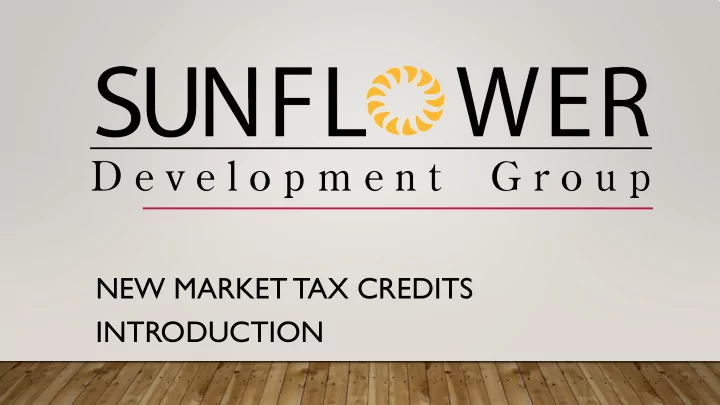

NEW MARKET TAX CREDITS INTRODUCTION
WHAT ARE NMTCS The NMTC was authorized in the Community Renewal Tax Relief Act of 2000, as part of a bi-partisan effort to stimulate • investment and economic growth in low income urban neighborhoods and rural communities. NMTC’s are a federal income tax credit issued to investors who commit capital to job creating-growth projects in qualified • census tracts (LICT’s). NMTC investors receive credits equal to 39% of the total project cost, issued over a 7-year compliance period (5% annually • for first 3 years, 6% for remaining 4 years). This program is administered by the CDFI Fund, a division of the U.S. Treasury. • The CDFI Fund issues “allocation” to selected Community Development Entities (CDE’s), which act as stewards of the • program, identifying, qualifying, and closing NMTC investment deals.
WHAT ARE NMTCS The NMTC allocation application process is highly competitive: • For the previous round ($3.51 billion authorized by Congress): • 263 applicants • 76 CDE’s awarded (28.9% success rate) • Average award of $46.2M • 7 first time winners (2.6% of the applicant pool, MIRF being one) • This is a scarce resource, with demand consistently outstripping supply. • Historically, the overwhelming majority of NMTC economic benefit has been delivered to investment real estate • construction, both in commercial properties and civic projects.
HOW DO NMTC’S WORK • CDE’s seek eligible projects that have a financing gap • A CDE is a mission driven for profit company approved by the Treasury that invests in projects that have a strong community impact • CDE’s have a specific investment footprint that range from City specific to national • CDEs select the type of projects they will specialize in • There are no Kansas-based CDEs
PARAMETERS OF PROJECTS • Projects must be located in distressed or highly distressed census tracts • 20% poverty (30% Poverty for Highly Distressed*) • Median family income below 80% AMI • High migration rural county, median family income below 85% of statewide median income • Typical project minimum size is $5 million
PROJECT IMPACTS • Creating quality living wage jobs in low-income communities • Assisting minority, women-owned and low-income community businesses • Offering flexible or below market lease rates to tenant businesses • Providing goods and services in low-income areas • Improving access to healthy and affordable food options • Improving environmental sustainability • Pioneering developments that will catalyze additional private investments in the community • Public/Private partnerships
COMMON NMTC PROJECTS • Commercial offices and retail • Mixed-used properties • Factories and industrial/manufacturing facilities • Community centers • Educational facilities • Health-related facilities – FQHCs, CAHs
EXCLUDED PROJECT TYPES • Race tracks or gambling related businesses • Business that primarily sell alcohol • Tanning salons and massage parlors • Golf clubs, country clubs • Farming*
BENEFIT TO PROJECT • NMTCs provide between 20%-22% equity to a project • NMTC equity is in the form of an interest-only loan for 7 years • Loan is converted to equity after compliance period • Reduces amount of borrower equity
CHALLENGES OF PROGRAM • Complexity • Many banks are unfamiliar with NMTC structure and requirements • Must have a strong guarantor or non-profit • Highly competitive • Timing of allocations • Chicken and egg scenario
KANSAS’ COMPETITIVE ADVANTAGE • High priority state for Treasury • Rural projects are difficult to find • CDEs seek interesting impactful stories for application • Job creation is low compared to other states • CDEs commit to high priority states and rural minimum
SDG SEEKING CDE CERTIFICATION • Projects between $5 million - $20 million • Seeking project for application pipeline • Healthcare expansion • Education • Community facilities • Industrial/manufacturing • Grocery stores • Timeline: 2017 – 2018 • Rural Kansas projects
CONTACT INFORMATION Chris Vukas Director of Economic Development Sunflower Development Group 1520 Grand Boulevard, Floor 2 Kansas City, MO 64108 cvukas@sunflowerkc.com 816-581-3996
Recommend
More recommend